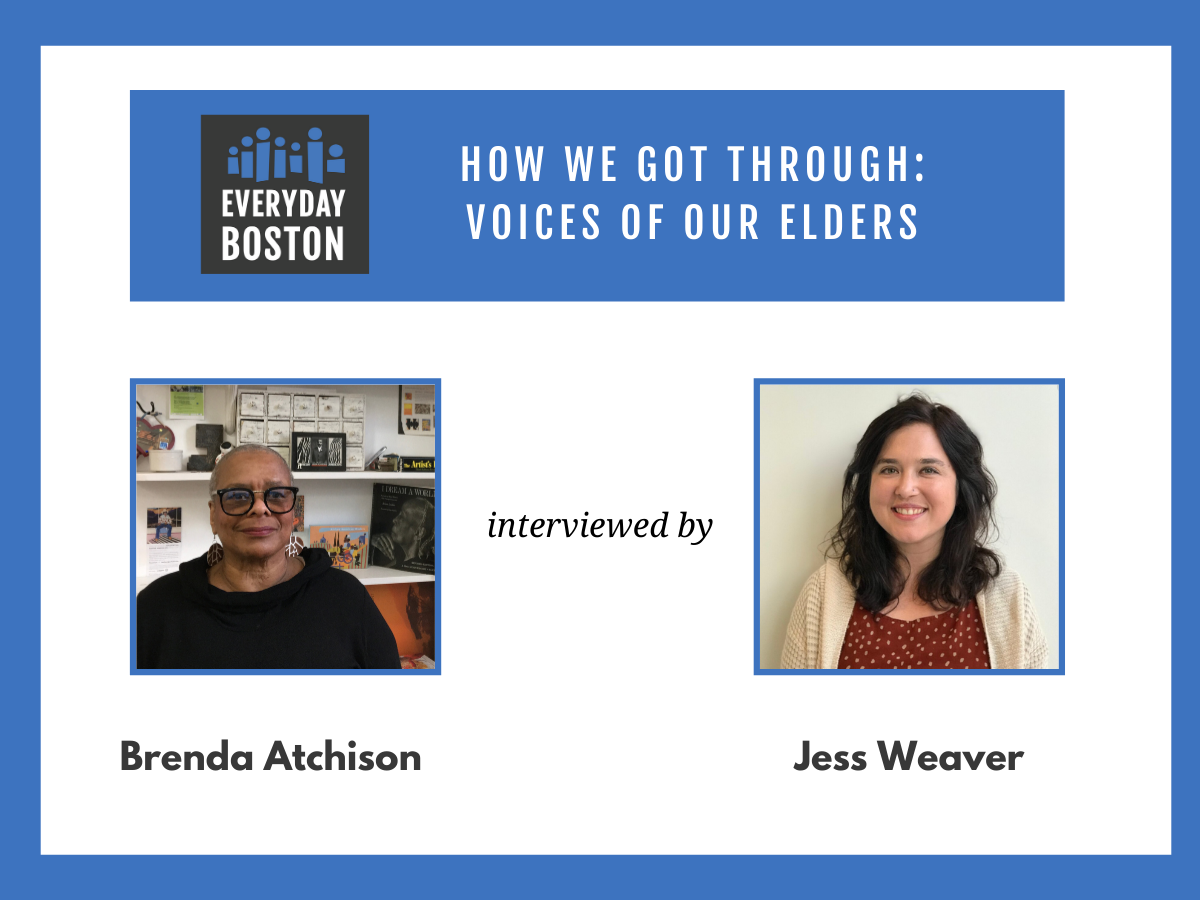Brenda Atchison, Roxbury
The How We Got Through project connects elders with younger Bostonians for recorded phone conversations during the pandemic about life- and how the elders got through tough times. This particular conversation is part of a series focused on Black elders’ experiences with racism.
In it, Brenda Atchison, retired from a varied career in industry and education, talks with Jess Weaver about growing up between between Boston and the rural suburb of Norton- and how race and racism played out in each community.
Below is an excerpt from their conversation, which also touched on everything from gentrification to the power of art. Read the longer, edited transcript here.
Jess: I’m kind of curious: What was that like for you as a young Black person, you know, moving to somewhere I gotta assume was much whiter. But maybe that’s not true?
Brenda: Oh, I would say it is. [laughs] I would say it’s a safe assumption. I was the only Black person in my graduating class. The class was only 98 people but I was still the only Black person.
But you know, I find it an interesting question because it really, from a race perspective, wasn’t a dramatic change. At that time, in Boston, in Roxbury, the communities were still integrated. It was white flight, you knew that and you could see that, but I had white friends who were my neighbors. So I moved to Norton, and I got white friends who were my neighbors! Not a whole lot of a difference.
The percentage and the proportions were different of course, but I kinda understood that already, seeing what was happening with whites moving out.
So, you know, the few little racist comments, like I can remember when my parents were out looking for a place to buy, we’d go out on Sundays and we’d drive around in various communities. And my dad, he was at a gas station or something, and stopped and inquired about you know, any properties around for sale or anything like that, just trying to chat people up. I distinctly remember, in Norton, a guy who said “Well, I could tell you where the colored people live!” [laughs]
So you know, there were those casual types of comments. So I can’t say I didn’t hear any, but I heard less than I heard in Boston, to be honest with you.
I did a conversation on equality and equity in America-- I co-hosted it with Encore at the end of June. So I wrote a story about an experience that just popped in my mind as a result of what’s going on now with all these deaths at the hands of police officers, of Black men. I had a recollection back to an incident that happened in Norton, when my brother was shot at by a local police officer.
So I wrote up the story and I called my brother to say, “Was I imagining? Did this really happen?” And he had forgotten too, and he’s like “No, you’re right! It really did happen!” So we talked about the incident and what that had really meant to us as a family. He also compared the incident to growing up in Boston, where he experienced constant hostility and harassment as a Black teenager and young man.
So in talking and listening to him, I began to think about racism and our experiences in a way that I didn’t before. Because I realized, for one thing--and even my brother said this, he said, “You know I think that’s kind of why I left the town.” And then he said, “The only thing I regret is not graduating from high school.” He went into the service and finished there.
But I never really had the view before. I never really looked at our experiences and realized that, Huh, there was a clear incident of what could have had a devastating result wasn’t--you know, it was just an incident and we went on and lived out our lives.

